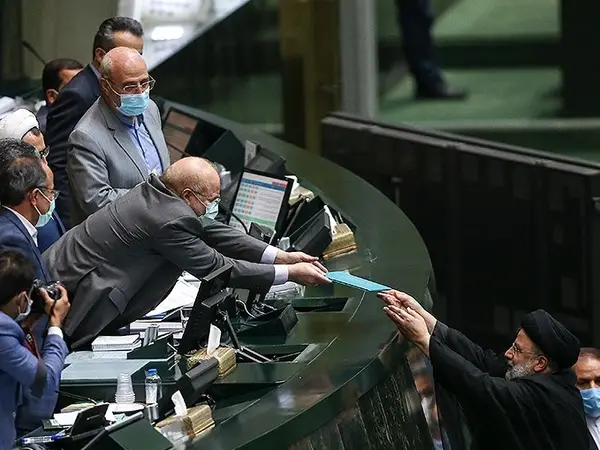A tough day awaits President Ebrahim Raisi at the Iranian Parliament (Majles) on Sunday, as he attends a session to defend his government's annual budget bill.
Political observers in Iran and abroad are waiting to see how true is the alliance between the hardliner government and the likeminded "revolutionary" parliament.
During the past weeks, many observers, including some prominent lawmakers have been criticizing the budget bill, characterizing it as " incoherent, risky and chaotic." According to moderate-conservative new website Khabar Online, the issue of doing away with the preferential rate of exchange of 42,000 rials per US dollar will be the focal point of the differences between the Majles and the administration.
This is the rate by which the government allocates dollars for importing essential commodities, such as basic food staples and medicines. The government is planning to cut what is regarded as a subsidy, except for buying wheat and medicine. The result is expected to be further inflation that some fear an end to the patience of low-paid Iranians who could launch protests.
In November 2019, a hike in fuel prices immediately led to nationwide protests that ended with security forces using military ammunition to kill at least 1,500 unarmed people.
According to Khabar Online, critics at the Majles say this is a high-risk budget bill that is not likely to curb the rising poverty rate in Iran. The lawmakers also fear that higher prices might prompt potential voters not to support them in the next election. The administration's daily newspaper, Iran, however, dismisses any criticism by the Majles simply as tactic by lawmakers for extracting concessions from the administration and share the power with the executive.
Raisi has said that he does not believe subsidizing essential commodities can help the country survive the current economic crisis. His critics at the Majles argue that the government should not try to bridge its huge budget deficit at the expense of the people. They further suggest that Raisi should start to reform the country's administrative structure.
Many parliamentarians have pointed out the perils of doing away with the preferential rate of exchange, and Majles Speaker Mohammad Bagher Ghalibaf has said that "the problem is not money, it is about not having good governance and not getting the people involved in the country's management."
Meanwhile, experts at the Majles Research Center have said that the budget for the year starting in March has a deficit between 3,000 to 6,000 trillion rials. They called on the government to reform its economic and administrative systems.
Meanwhile, as moderate conservative Aftab News website pointed out, Raisi's economic team does not appear to have a roadmap for the country's economy. Like many other media outlets and politicians, Aftab News has also highlighted the lack of coordination among the members of Raisi's economic team.
During the past six months when Raisi was putting together his team, many in and out of the Majles warned him about the danger of having people from different walks of life and little experience in managing the economy as a team.
Khorasan daily pointed out in September that the members of this team come from many different offices and that they have never worked with each other before. Most of them never had challenging executive jobs and have been simply spending hefty state budgets at their disposal in their previous posts.
Hardline lawmaker Elias Naderan has said that lack of coordination among the members of Raisi's economic team is a major cause for concern. Naderan also called on Raisi to announce who is in charge and who determines policy. Another hardliner economist, Ahmad Tavakoli also criticized the lack of coordination in an interview with Sharq daily and warned that "The people can tolerate high prices and inflation only up to a point.”
